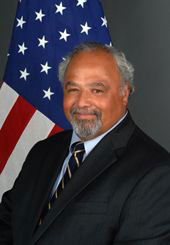Ambassador Goosby's long view on the fight against HIV/AIDS
July / August 2011 | Volume 10, Issue 4

U.S. Global AIDS Coordinator
Dr. Eric Goosby
By Andrew Palos
U.S. Global AIDS Coordinator Dr. Eric Goosby, director of the U.S. President's Emergency Plan for AIDS Relief (PEPFAR), recently reviewed the results from the June 8-10, 2011 U.N. High Level meeting on AIDS, and offered a perspective on the last decade of the fight against HIV/AIDS and how this experience can enhance future American effectiveness. During his talk at the Center for Strategic and International Studies, Goosby highlighted the progress made at the high level meetings with encouraging words about the future: "We can see the light at the end of the tunnel," he said.
PEPFAR has improved cooperation across government agencies and reduced HIV transmission rates since 2003, Goosby said. The program has built on successes from the Bush administration to enhance funding and results in the Obama administration. PEPFAR has seen a direct relationship between increased funding and decreased death rates.
Goosby emphasized the need to maximize investment opportunities. Future U.S. and foreign partnerships must direct the partners to take country-ownership for HIV/AIDS services. Country-ownership is vital for future development; it makes the circle of dialogue on HIV/AIDS much tighter, allows countries to move to self-sustaining responses, and allows the U.S. to focus on implementation dialogue - medical education, civil society development and gender equity - Goosby said.
One of the main goals set at the meeting is the elimination of mother-to-child transmission and other AIDS-related maternal deaths that have not been completely confronted. There was unanimous support for focusing on improving substantive care for women and girls who are particularly affected by AIDS. Goosby expressed optimism at the progress thus far, but emphasized the importance of sharing responsibility among all countries for the future of HIV/AIDS prevention and treatment.
To view Adobe PDF files,
download current, free accessible plug-ins from Adobe's website.